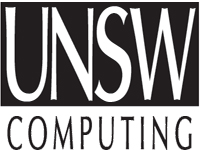Bioinformatics - 3647
Program Summary
Faculty: Faculty of Engineering
Contact: http://www.cse.unsw.edu.au
Campus: Kensington Campus
Career: Undergraduate
Typical Duration: 4 Years
Typical UOC Per Semester: 24
Min UOC Per Semester: 3
Max UOC Per Semester: 27
Min UOC For Award: 192
UAC Code: 425010
International Entry Requirements: See International Entry Requirements
Award(s):
Bachelor of Engineering (Major)
Information valid for students commencing 2013.
Students who commenced prior to 2013 should go to the Handbook's Previous Editions
Program Description
Bioinformatics graduates receive a Bachelor of Engineering after four years. The program is multi-disciplinary and students will achieve a high level of expertise across computing, maths and biology. Students will undertake major project in the fourth year bringing these areas together.
Note:
BE (Bioinformatics)/BA program 3704,
BE (Bioinformatics)/BSc program 3755
BE (Bioinformatics)/BComprogram 3715
BE(Bioinformatics)/MBiomedE program 3757
Program Objectives and Graduate Attributes
Program Structure
- BABS1201 Molecules, Cells and Genes (6 UOC)
- COMP1917 Computing 1 (6 UOC)
- COMP1927 Computing 2 (6 UOC)
- BINF1001 Bioinformatics 1 (6 UOC)
- ENGG1000 Engineering Design (6 UOC)
- MATH1131 Mathematics 1A (6 UOC)
- MATH1141 Higher Mathematics 1A (6 UOC)
- MATH1231 Mathematics 1B (6 UOC)
- MATH1241 Higher Mathematics 1B (6 UOC)
- CHEM1011 Chemistry A (6 UOC)
- CHEM1031 Higher Chemistry A (6 UOC)
- CHEM1021 Chemistry B (6 UOC)
- CHEM1041 Higher Chemistry B (6 UOC)
- BINF1001 Bioinformatics 1 (6 UOC)
- ENGG1000 Engineering Design (6 UOC)
- BABS2202 Molecular Cell Biology 1 (6 UOC)
- BIOC2101 Principles of Biochem (Adv) (6 UOC)
- BIOS2021 Genetics (6 UOC)
- BIOS2621 Genetics (Advanced Level) (6 UOC)
- MICR2011 Microbiology 1 (6 UOC)
- Life Sciences Elective (6UOC)
- Computing/Maths Elective (6UOC)
- COMP4930 Thesis Part A (6 UOC)
- COMP4931 Thesis Part B (6 UOC)
- Life Sciences Elective (6UOC)
- Computing/Maths Elective (6UOC)
- Computing/Maths/Life Sciences Elective
- Free Elective (6UOC)
- General Education (12UOC)
Any BIOC/BIOT/MICR/BABS3xxx course for which prerequisites have been completed can be selected as a 3rd year life science elective.
Recommended electives include:
- MATH2281 Biomathematics (6 UOC)
- MATH2831 Linear Models (6 UOC)
- MATH2931 Higher Linear Models (6 UOC)
- MATH3801 Probability & Stochastic Proc (6 UOC)
- MATH3811 Statistical Inference (6 UOC)
- MATH3901 Higher Prob & Stochastic Proc (6 UOC)
- MATH3911 Higher Statistical Inference (6 UOC)
General Education Requirements
Honours
Honours Class 1: WA greater than or equal to 75
Honours Class 2: Division 1: WA equal to 70 up to and including 74
Division 2: WA equal to 65 up to and including 69
Academic Rules
1. The Bachelor of Engineering is awarded following the completion of a minimum of 192 units of credit.
2. The specific requirements for the Bachelor of Engineering in the various disciplines are set out in the relevant sections in this Handbook.
3. The degree may be awarded with Honours, based upon the overall performance in the program and in accordance with Faculty and School policies. Honours are awarded in the following classes - Class 1, Class 2 Division 1, Class 2 Division 2.
4. The standard duration of the program is four years, or eight semesters, of full-time study each comprising 24 units of credit. Students may undertake the program over a longer period on the basis of part-time study.
5. Each student is required to complete a minimum of 60 days of approved experience in industry prior to graduation.
6. General Education electives may only be attempted after the student has attempted at least 24 units of credit.
Fees
Industrial Training
Further Information and Requirements
Professional Recognition
The professional body for engineering in Australia is Engineers Australia, which has as its first objective the promotion of the science and practice of engineering in all its branches.
Engineers Australia has its national headquarters in Canberra and functions through a series of divisions, the local one being the Sydney Division. Within each division are branches representing the main interests within the profession, e.g. civil, mechanical, electrical, engineering management and environmental engineering.
Students of an approved school of engineering may join the Institution as a student member (StudIEAust). Student members receive the monthly publication Engineers Australia and for a small fee they also receive The Transactions which contains articles on a particular branch of engineering.
Student members are invited to participate in the Excellence Award for Work Experience, the National Young Engineer of the Year Award and to avail themselves of other Engineers Australia services including the Mentor Scheme and industrial experience guidance.
For more information and membership application forms, contact Engineers Australia, Sydney Division, Level 3, 8 Thomas Street, CHATSWOOD NSW 2067 - telephone 02 9410 5600 www.engineersaustralia.org.au
The Australian Computing Society
The peak professional body for computing in Australia is the Australian Computing Society (ACS) - www.acs.org.au
The objectives of the ACS can be found here and include: "advanc[ing] professional excellence in information and communications technology, and further[ing] the study, science and application of information and communications technology."
Again, students who want to join ACS should go to Member Application
Area(s) of Specialisation









